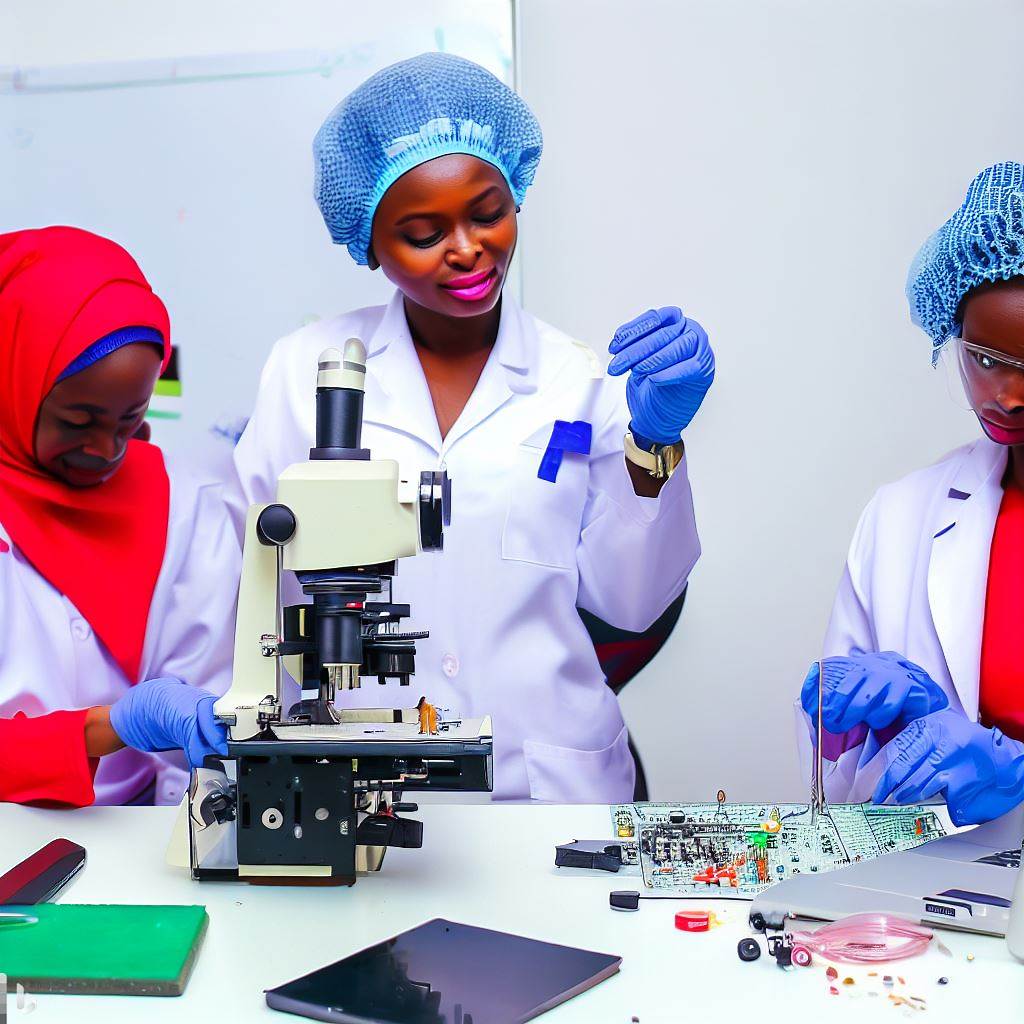Introduction
The fusion of engineering principles with medical sciences forms the dynamic field of biomedical engineering in Nigeria.
This discipline is dedicated to enhancing healthcare through the innovation of cutting-edge medical devices and technologies.
In Nigeria, the significance of career paths for biomedical engineers cannot be overstated, as they play a pivotal role in steering the advancement and maturation of the nation’s healthcare infrastructure.
These professionals are instrumental in bridging the gap between medicine and engineering, thereby contributing profoundly to the betterment of healthcare outcomes and the overall wellbeing of the population.
As Nigeria continues to evolve, the role of biomedical engineers in carving progressive career trajectories is paramount in shaping the trajectory of healthcare progress in the country.
Overview of Biomedical Engineering
Biomedical engineering synergizes engineering and medical sciences, enhancing healthcare technologies, devices, and processes.
It’s pivotal in diagnosing, treating, and preventing medical conditions, globally elevating patient outcomes and life quality.
Notably, the field propelled advanced medical imaging (MRI, CT, ultrasound), vital in precise disease diagnosis.
Biomedical engineering fostered inventive medical devices like pacemakers, artificial organs, and robotic-assisted surgery, reshaping medical interventions and fostering independence for those with disabilities.
Moreover, it’s pivotal in crafting electronic health records (EHRs) and telemedicine, streamlining healthcare globally, even in remote areas.
In Nigeria, with healthcare challenges and a high disease burden, biomedical engineering can design customized solutions.
For instance, addressing cardiovascular diseases with affordable diagnostic tools would curtail related ailments.
Nigeria’s healthcare infrastructure gaps can be bridged using telemedicine and mobile health tech, expanding access.
The government’s initiatives acknowledge biomedical engineering’s role, yet investments in infrastructure and capacity building are vital for its full potential.
Generally, biomedical engineering unites engineering and medical sciences to transform global healthcare. In Nigeria, it holds answers to healthcare issues and can enhance access and delivery.
“Career Paths for Biomedical Engineers in Nigeria” encompass research, innovation, and infrastructure development.
Educational Requirements for Biomedical Engineers
Becoming a biomedical engineer in Nigeria necessitates specific academic qualifications.
Typically, a bachelor’s degree in biomedical engineering or a related field is the minimum requirement, with specializations like biomedical instrumentation, tissue engineering, and biomaterials available.
A strong foundation in mathematics, biology, physics, chemistry, and computer science during secondary education is crucial.
Essential skills include analytical thinking, problem-solving, and critical reasoning.
Renowned Nigerian universities, including the University of Lagos, Ahmadu Bello University, and Obafemi Awolowo University, offer respected biomedical engineering programs.
Others like the University of Nigeria, Nnamdi Azikiwe University, and Covenant University also provide quality education in this field.
Continuous learning is pivotal for biomedical engineers, ensuring they stay updated with technological advancements and evolving healthcare needs.
Workshops, seminars, and engaging with professional organizations such as the Biomedical Engineering Society of Nigeria offer networking and career growth opportunities.
Advanced degrees like Master’s or Ph.D. programs, along with certifications like the Certified Clinical Engineer credential, enhance credibility and career prospects.
Adapting to emerging technology and industry trends through continuous professional development is vital for success.
By fulfilling educational requirements and embracing lifelong learning, aspiring biomedical engineers in Nigeria can excel in a field offering diverse opportunities for personal and professional growth, positively impacting healthcare advancement and society.
Career Opportunities for Biomedical Engineers in Nigeria
Biomedical engineering is a growing field in Nigeria, offering numerous career opportunities in various sectors.
Here, we will discuss the different sectors that employ biomedical engineers in Nigeria, the diverse roles and job titles available for them, and provide examples and success stories of Nigerian biomedical engineers who have made significant contributions to their careers.
Sectors Employing Biomedical Engineers in Nigeria
- Hospitals: Biomedical engineers play a crucial role in healthcare settings, where they are involved in the design, development, and maintenance of medical equipment and technology.
They ensure the safe and efficient operation of medical devices and provide technical support to medical staff. - Research Institutes: Biomedical engineers contribute to research and development activities in institutes and universities.
They work on innovative projects, such as designing new medical devices, improving existing technologies, and conducting research to enhance healthcare delivery. - Medical Device Companies: Many Nigerian biomedical engineers find employment in medical device companies.
They are involved in the design, manufacturing, and testing of medical equipment, ranging from diagnostic tools to surgical instruments. These engineers ensure compliance with quality and safety standards. - Government Agencies: Some biomedical engineers work in government organizations responsible for healthcare policies and regulations.
They contribute to the development of standards and guidelines related to medical devices and technologies, ensuring their safety and efficacy. - Biomedical Engineering Consultancies: These consultancies offer services to healthcare institutions, providing expertise in equipment selection, planning, and implementation.
Biomedical engineers in these organizations work on projects ranging from hospital infrastructure setup to procurement and maintenance of medical devices.
Diverse Roles and Job Titles for Biomedical Engineers
- Clinical Engineer: Responsible for managing and maintaining medical equipment in hospitals and healthcare facilities.
- Biomechanical Engineer: Specializes in designing and developing prosthetic limbs, orthopedic implants, and assistive devices.
- Rehabilitation Engineer: Focuses on developing assistive technologies for individuals with disabilities, such as wheelchairs and communication devices.
- Biomaterials Engineer: Works on the development and testing of materials used in medical devices, implants, and tissue engineering.
- Medical Imaging Engineer: Specializes in the maintenance and troubleshooting of medical imaging equipment, such as X-ray machines and MRI scanners.
Examples and Success Stories
- Dr. Emmanuel Okechukwu: Dr. Okechukwu is a renowned Nigerian biomedical engineer who developed an affordable and portable electrocardiogram (ECG) machine.
His innovation has helped improve cardiac diagnosis in rural areas. - Dr. Funmilayo Oluwole: Dr. Oluwole is a leading researcher in cancer treatment. She has contributed to the development of a novel drug delivery system that targets cancer cells, reducing side effects for patients.
- Arinze Ugwu: Arinze is a biomedical engineer who co-founded a medical device company focusing on low-cost ultrasound machines.
Their affordable devices have been instrumental in improving access to diagnostic imaging in underserved communities.
These examples highlight the contributions of Nigerian biomedical engineers in improving healthcare technology and patient care.
They serve as inspirations for aspiring engineers looking to make a difference in the field.
In short, biomedical engineering offers promising career opportunities in Nigeria.
With sectors like hospitals, research institutes, medical device companies, and government agencies employing biomedical engineers, individuals can explore diverse roles and job titles.
The success stories of Nigerian biomedical engineers further demonstrate the potential for innovation and impact in this field.
Read: The Impact of Technology on Biomedical Engineering in Nigeria
Challenges and Opportunities in the Field
Biomedical engineering is an emerging field in Nigeria with various challenges and opportunities for professionals in the industry.
Here, we will discuss the challenges faced by biomedical engineers in Nigeria as well as the opportunities for growth and development.
Challenges Faced by Biomedical Engineers in Nigeria
- Limited resources: Biomedical engineers in Nigeria often face the challenge of working with limited resources, including equipment and materials needed for research and development.
- Inadequate funding: The field of biomedical engineering requires significant funding for research, training, and the development of medical devices.
However, there is often a lack of adequate funding in Nigeria. - Infrastructure: The country’s healthcare infrastructure is still developing, and this presents a challenge for biomedical engineers. Inadequate facilities and infrastructure limit their ability to carry out their work effectively.
- Lack of specialized training programs: Biomedical engineers in Nigeria often struggle with the limited availability of specialized training programs.
This makes it difficult for them to acquire the necessary skills and knowledge in their field. - Regulatory challenges: The regulations and standards governing the field of biomedical engineering in Nigeria are still evolving.
This poses challenges in terms of ensuring quality control and complying with international standards.
Opportunities for Growth and Development
- Collaboration with international organizations: Biomedical engineers in Nigeria can collaborate with international organizations to facilitate knowledge exchange, access to resources, and funding opportunities.
- Advancements in technology: Rapid technological advancements offer opportunities for growth in biomedical engineering. Engineers can leverage these advancements to develop innovative medical devices and solutions.
- Government support: The Nigerian government recognizes the importance of biomedical engineering and supports the field through funding research projects and establishing specialized training programs.
- Entrepreneurship and innovation: Many biomedical engineers in Nigeria are exploring entrepreneurship, starting companies, and developing products that cater to the specific needs of the healthcare system.
- Addressing healthcare challenges: Biomedical engineers can impact healthcare challenges by developing affordable and accessible medical devices to improve healthcare delivery and outcomes.
In the end, while biomedical engineers in Nigeria face various challenges such as limited resources, inadequate funding, and infrastructure, there are also numerous opportunities for growth and development.
Collaboration with international organizations, advancements in technology, government support, entrepreneurship, and addressing healthcare challenges are all avenues for biomedical engineers to contribute to the field and make a positive impact on healthcare in Nigeria.
Read: Nigerian Biomedical Engineers: Making a Global Impact

Explore Further: How Nigeria’s Culture Influences its Software Industry
Required Skills and Competencies
List of Essential Skills
- Technical expertise in biomedical engineering principles and practices.
- Knowledge of medical equipment, devices, and their application in healthcare settings.
- Ability to analyze, design, and develop biomedical systems and solutions.
- Proficiency in computer-aided design (CAD) software for modeling and simulation.
- Strong problem-solving skills to identify and resolve complex technical issues.
- Attention to detail and excellent analytical skills for precise data evaluation.
- Understanding of regulatory standards and compliance in biomedical engineering.
- Knowledge of safety protocols to ensure the reliability and functionality of medical devices.
- Familiarity with medical terminology and clinical practices for effective collaboration with healthcare professionals.
- Continuous learning and staying updated with advancements in biomedical engineering.
Explanation of Essential Skills
Technical expertise in biomedical engineering principles and practices is a fundamental requirement for success in this field.
It involves understanding the theoretical foundations and practical applications of engineering concepts in healthcare.
Knowledge of medical equipment, devices, and their application in healthcare settings helps biomedical engineers to effectively operate, maintain, and troubleshoot various medical devices.
The ability to analyze, design, and develop biomedical systems and solutions is crucial for creating innovative technologies that address specific healthcare challenges.
Proficiency in computer-aided design (CAD) software allows biomedical engineers to design and simulate medical devices, ensuring their functionality and adherence to performance specifications.
Strong problem-solving skills are essential for identifying issues, determining root causes, and implementing effective solutions to enhance medical equipment performance and patient outcomes.
Attention to detail and excellent analytical skills are necessary for evaluating data accurately, interpreting results, and making informed decisions based on empirical evidence.
Understanding regulatory standards and compliance in biomedical engineering is vital to ensure that medical devices meet safety and quality requirements set by regulatory authorities.
Knowledge of safety protocols enables biomedical engineers to minimize risks associated with medical equipment and ensure patient safety.
Familiarity with medical terminology and clinical practices facilitates effective communication and collaboration with healthcare professionals, leading to better healthcare outcomes.
Continuous learning and staying updated with advancements in biomedical engineering is crucial to remain competent and adapt to rapidly evolving technologies in the healthcare industry.
Importance of Effective Communication, Problem-Solving Abilities, Teamwork, and Adaptability
Effective communication is vital for biomedical engineers to understand and convey technical information clearly to colleagues, healthcare professionals, and patients.
It ensures coordinated efforts, improves patient care, and fosters innovation.
Problem-solving abilities are essential in biomedical engineering as engineers need to identify and resolve complex technical issues efficiently.
Innovative solutions can improve medical devices, enhance patient outcomes, and advance healthcare technology.
Teamwork plays a crucial role as biomedical engineers often collaborate with multidisciplinary teams comprising healthcare professionals, scientists, and technicians.
By working together, they can leverage diverse expertise to develop comprehensive solutions.
Adaptability is important in the dynamic field of biomedical engineering as professionals need to embrace new technologies, methodologies, and changes in healthcare regulations efficiently.
It allows them to remain competitive and contribute effectively to the industry.
In conclusion, succeeding as a biomedical engineer in Nigeria requires a combination of technical expertise, problem-solving skills, effective communication, teamwork, and adaptability.
With these skills and competencies, professionals can contribute significantly to the advancement of healthcare technology and improve patient outcomes.
Read: Day in the Life of a Nigerian Biomedical Engineer
Learn More: How Mechanical Engineers are Shaping Nigeria’s Future
Professional Organizations and Networking
When pursuing a career as a biomedical engineer in Nigeria, it is crucial to be aware of the professional organizations and associations related to this field.
These organizations provide numerous benefits to professionals, such as networking opportunities, access to resources, and professional development.
Here are some key professional organizations and associations in Nigeria that are relevant to biomedical engineering:
- Nigerian Society of Engineers (NSE): The NSE is a leading professional organization in Nigeria, providing a platform for engineers to network and collaborate.
They have a biomedical engineering division that focuses on promoting the interests of biomedical engineers in the country. - Biomedical Engineering Society of Nigeria (BMESN): This society is dedicated to advancing biomedical engineering knowledge and practice in Nigeria.
It organizes conferences, workshops, and seminars, creating opportunities for professionals to connect and share their expertise. - National Association of Biomedical Engineers (NABE): NABE is a professional association that aims to enhance the professional development of biomedical engineers in Nigeria.
They offer training programs, certifications, and other resources to support the growth of the profession.
Benefits of joining these organizations, such as networking opportunities, access to resources, and professional development
Joining these professional organizations can be highly beneficial for biomedical engineers in Nigeria. Here are some advantages of joining:
- Networking Opportunities: By being a member of these organizations, you gain access to a vast network of professionals in the field.
This networking can lead to collaborations, job opportunities, and mentorship. - Access to Resources: Professional organizations often provide members with access to valuable resources such as research papers, journals, technical reports, and industry publications.
These resources can greatly enhance your knowledge and keep you updated with the latest advancements. - Professional Development: These organizations frequently organize workshops, training sessions, and conferences that provide opportunities for professional development.
Attending these events can help you sharpen your skills, learn about new technologies, and stay competitive in the field. - Industry Recognition: Being a member of reputable professional organizations adds credibility to your profile and enhances your professional reputation.
It demonstrates your commitment to the field and can attract potential employers or clients. - Mentorship and Guidance: Professional organizations often have mentorship programs where experienced professionals guide and support younger members.
This mentorship can be invaluable for career growth and obtaining guidance throughout your professional journey.
All in all, joining professional organizations and associations related to biomedical engineering in Nigeria is highly advantageous.
These organizations offer networking opportunities, access to valuable resources, and avenues for professional development.
By becoming a member, you can enhance your career prospects, stay updated with the latest industry trends, and connect with like-minded professionals who can support your growth.
Read: Postgraduate Studies: Biomedical Engineering in Nigeria
Conclusion
The career paths for biomedical engineers in Nigeria are vast and promising. Biomedical engineers play a crucial role in improving healthcare facilities and finding innovative solutions to medical challenges.
The importance of career paths for biomedical engineers in Nigeria cannot be overstated.
They contribute to the advancement of medical technology, the efficiency of healthcare delivery, and the overall improvement of healthcare outcomes in the country.
To aspiring biomedical engineers, it is essential to pursue your passion and explore the opportunities in this field.
Nigeria presents numerous avenues for growth and development in the biomedical engineering sector. Embrace the challenges, seek knowledge, and strive to make a difference in people’s lives through your work.
By becoming a biomedical engineer, you have the chance to impact healthcare in Nigeria and contribute to the well-being of society.
The field offers a fulfilling and rewarding career, both professionally and personally. So, follow your passion and embark on this exciting journey to create a positive change in healthcare in Nigeria.




